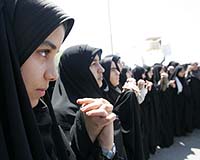 |
Baghdad (AFP) Dec 12, 2009 Interior Minister Jawad Bolani, who faced a grilling in parliament on Saturday over this week's bombings, wants Iraqis to turn the page on ex-dictator Saddam Hussein's Baathists who ruled the country. "The Baath party belongs to the past and political parties must look to the future," said Bolani, 49, an independent Shiite who is running in the March 7 legislative election. "Violence, hatred, grudges and marginalisation will not bring the dead back to life but will be the cause of more Iraqi deaths," the minister told AFP in an interview. Coordinated bombings rocked Baghdad on Tuesday killing 127 people and wounding 450 others. A senior police officer has said Al-Qaeda and backers of the banned Baath party were behind the blasts. The interior minister was summoned to parliament on Saturday along with Defence Minister Abdul Qader Obeidi amid outrage by MPs over the failure to prevent the attacks. Bolani has allowed 14,300 former officers who served under executed dictator Saddam to join the police since becoming interior minister in June 2006 -- despite harsh criticism from political rivals in Shiite religious parties. He staunchly believes former Baathists should be given the benefit of the doubt and insists that many of them "today believe in democracy" and should "take part in the political process." "We must turn the page," said Bolani. "Those who have been given the opportunity to join the institutions of the new regime have proven their honesty and their efficiency in rebuilding the nation," he said. The Shiite Islamic Supreme Council of Iraq and the radical Sadrist movement claim that attacks like Tuesday's have been made possible because former Baathists have been allowed to join the army and police. Not so, said Bolani. "Those who have suffered from the Baath party must refer to the judiciary, not to the politicians," he said. "This is how we can re-establish civilian peace." He also insists that the police before 2006 "suffered from confessionalism and corruption." "Before I came to the interior ministry, people feared the police. Now they seek their protection." Paul Bremer, the US official in charge in post-invasion Iraq, launched a de-Baathification campaign immediately after Saddam's overthrow by the US-led coalition in 2003. As a result hundreds of thousands of Baathist civil servants were sacked, with many forced into exile while others joined the insurgency. Hundreds were also liquidated by revenge squads. A de-Baathification law was adopted in January 2008, authorising the payment of pensions and conditional reintegration of former low-level Baathists into the civil service and armed forces. Senior former party members, however, have been dismissed along with ex-members of the intelligence services. Bolani -- a former mechanical engineer in Saddam's air force -- hopes to secure a seat in the next parliament and has joined forces in October with key leaders to forge a multi-confessional political bloc. A prominent member of the new Iraqi Unity Alliance is Sunni tribal leader Ahmed Abu Risha who turned against Al-Qaeda in 2006 to play a major role the US fight against Iraq's insurgency. Bolani is presenting himself as the candidate of Iraqis who lived under Saddam and believes that politicians who returned to Baghdad thanks to the US-led invasion have only created mayhem in the country. His coalition includes political figures who lived in Iraq under Saddam's iron-fisted regime. "We understand the needs of the people," said Bolani. He accused leaders who returned after the toppling of Saddam of having fueled confessional conflict. "When they came in 2003 they said that the Shiites were afraid of the Sunnis and vice versa. There was no longer trust among neighbours," according to Bolani. "The Americans brought to power people who had lived in exile in Iran, Syria, the United States, Britain, and they came with partisan attidudes. Their ambition was not to build a nation," he said. "This created chaos," he said, complaining of what he called "political Islam." Asked to comment on the Shiite Dawa party and Prime Minister Nuri al-Maliki's non-sectarian State of Law Coalition, Bolani quoted an Arabic proverb: "Snakes changes their skin each year, but remain snakes." Share This Article With Planet Earth
Related Links Iraq: The first technology war of the 21st century
 Iraq defence minister asks for budget to pay informers
Iraq defence minister asks for budget to pay informersBaghdad (AFP) Dec 12, 2009 Iraqi Defence Minister Abdel Qader Obeidi on Saturday asked parliament for funds to recruit informers, saying that the authorities lacked sufficient information on insurgents. "Our intelligence services desperately lack information since their budget is so small, and the law states that in order to pay an informer they first have to give his full name and his sources," Obeidi told MPs. ... read more |
|
| The content herein, unless otherwise known to be public domain, are Copyright 1995-2009 - SpaceDaily. AFP and UPI Wire Stories are copyright Agence France-Presse and United Press International. ESA Portal Reports are copyright European Space Agency. All NASA sourced material is public domain. Additional copyrights may apply in whole or part to other bona fide parties. Advertising does not imply endorsement,agreement or approval of any opinions, statements or information provided by SpaceDaily on any Web page published or hosted by SpaceDaily. Privacy Statement |